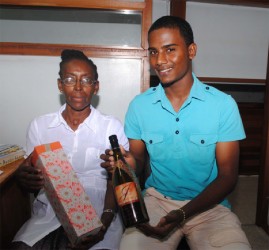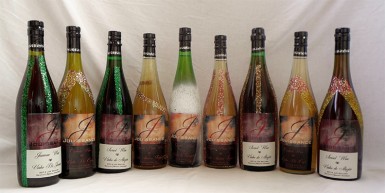A Guyanese brother and sister team is in the process of staking a place in the manufacturing sector, with a local wine-making industry that has proceeded in fits and starts, over the years.
Jo-Ann and Vishal Joseph are using their company, JJV Cellars, to further popularize the use of local fruit in the manufacture of fine wines.
The emergence of JJV Cellars provides more evidence of the potential of the agro-processing sub-sector. Whether potential can be transformed into readiness is a question for which, as yet, there is no answer.
The Joseph siblings are hoping to reap a measure of reward from their father’s long-held passion for wine-making, a pursuit which he practiced for several years whilst residing in the United Kingdom, and one which he passed on to Jo-Ann, the older sibling. Both of them have now resettled in Guyana.
Speaking with Stabroek Business recently she reflected on fruit picks on farms in the UK and on her father’s production of strawberry wine to share with the family during the 1970s. She sat at her father’s feet during those years so that when she eventually returned to Guyana during the 1980s the wide range of fruit available locally provided a considerable incentive to immerse herself in the industry; though she concedes that the state of the economy at the time was not particularly encouraging.

Jo-Ann’s 21-year-old brother, Vishal, is, like their wine, more of a home-grown product. The former QC boy and current Texila University medical student had been inducted into the art of wine-making as a hobby, sharing the taste with family and friends. These days, he discusses business issues like the challenges associated with sourcing wine bottles, costs of packaging, customs duties and freight charges.
Vishal has also made product-promotion his forte, immersing himself in promoting the staging of wine-tasting events and otherwise seeking to prevail upon his own generation to cultivate a taste for fruit wines.
With an increasing number of small investors having ventured into the processing of fruit into juices, concentrates, jams and jellies in recent years, fresh fruit has become both scarce and costly. The Josephs rely for part of their fruit supplies on produce from a farm operated by their father at Coverden, East Bank Demerara which supplies cherry and guava, among other fruit, to Demerara Distillers Ltd, to help meet that company’s beverage-manufacturing requirements.
With a decidedly modest capital investment of around $400,000, JJV Cellars has quietly stayed the course. Production levels are still modest; between 150 and 250 bottles of wine per month. It is a decidedly small beginning but it is the potential for growth that animates Jo-Ann and Vishal.

JJV’s wines are made from a wide range of fruit that includes plum, cashew, pineapple, jamoon, tangerine, passion fruit, and sorrel. Two additional flavours are manufactured from honey and ginger.
The enterprise, the Josephs say, is very much a work in progress. Product refinement is an ongoing pursuit. It is a process that derives from an evolving understanding of the market which the product serves, as well as a preparedness to invest in the equipment and the knowledge that attends product refinement. Then there are the customary bugbears that plague the local manufacturing sector like the high costs associated with labelling and packaging. Those are challenges which, the Josephs say, they intend to meet and overcome over time.
There is, as yet, no talk about targeting an overseas market. The initial focus, it seems, is on local product production. A promotional event is planned to coincide with Valentine’s Day, this year.
A bottle from the JJV Cellars could set you back between $3,000 and $5,000. Vishal says that production costs account for 50 per cent of the price. Bottling, labelling and packaging also carry significant additional costs including those associated with the importation of bottles and packaging material. Good wine, the world over, doesn’t come cheap, and the proprietors of JJV Cellars say that their focus is on offering a product that helps to take the local wine industry to another level.




